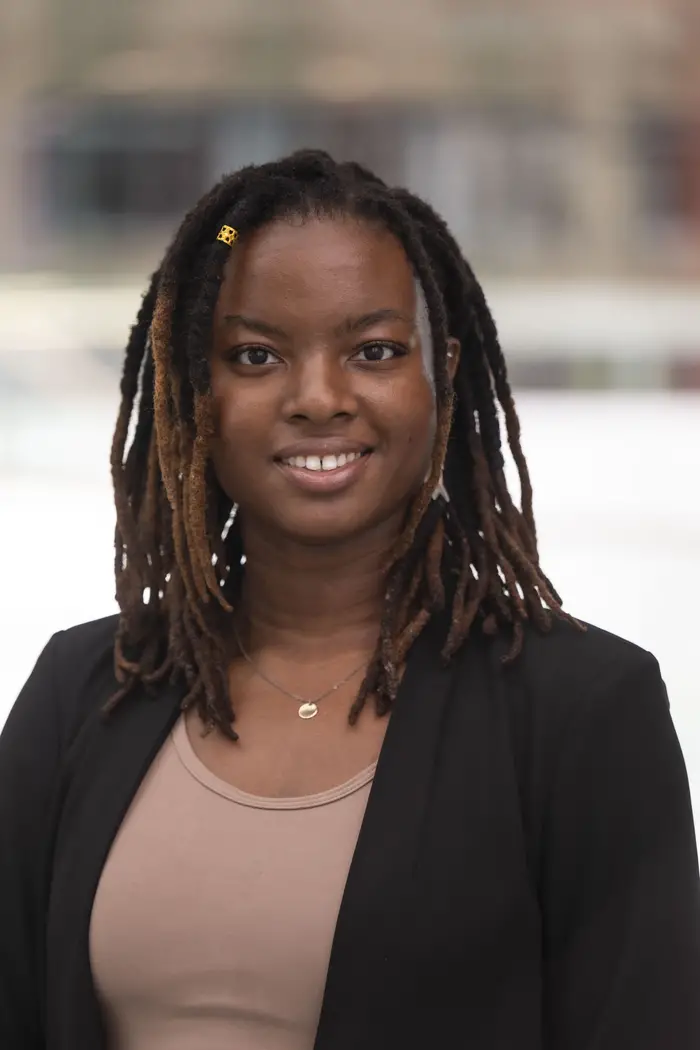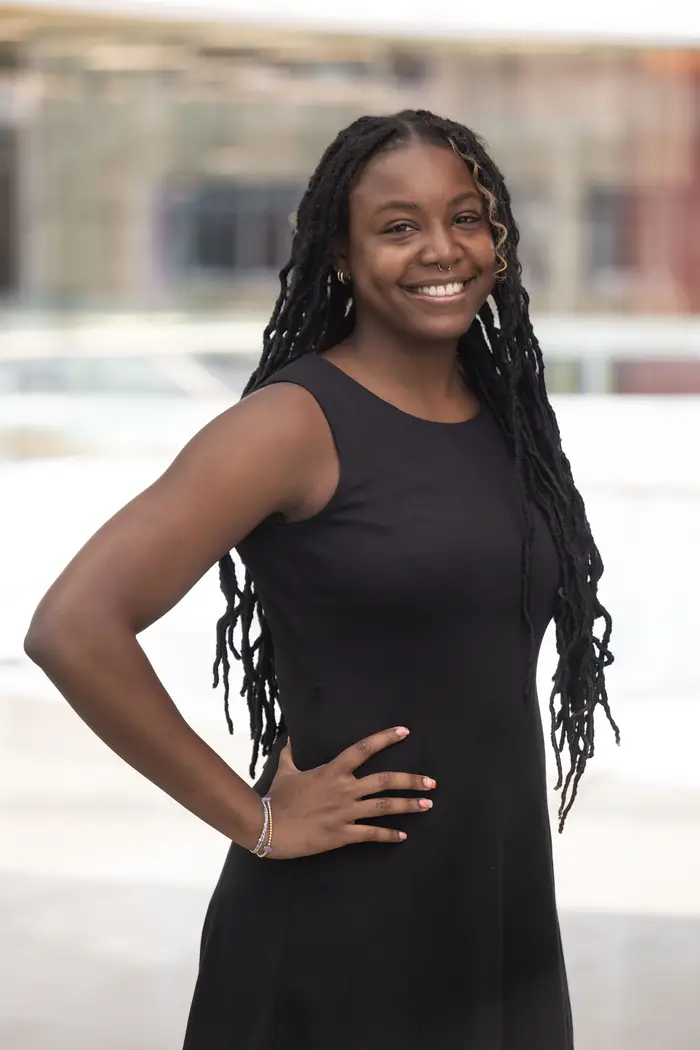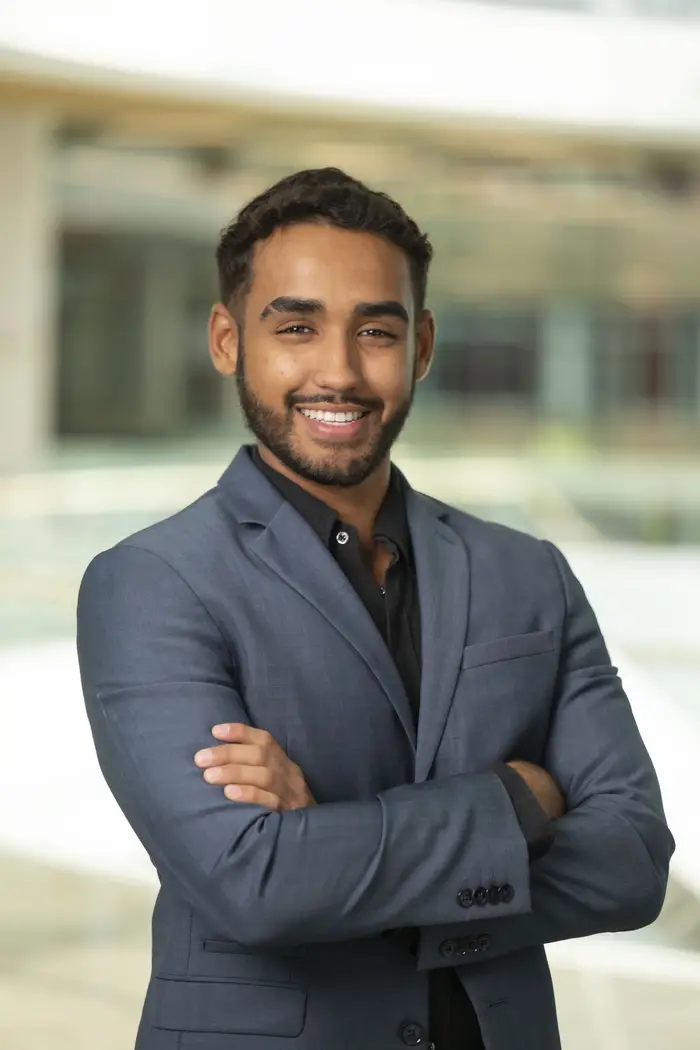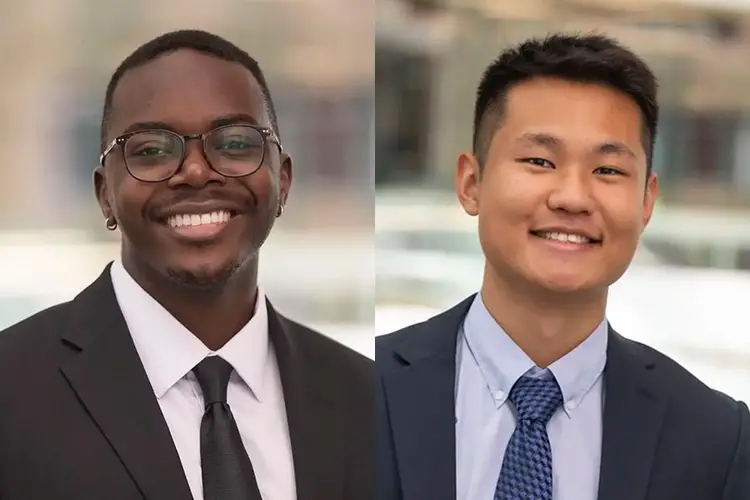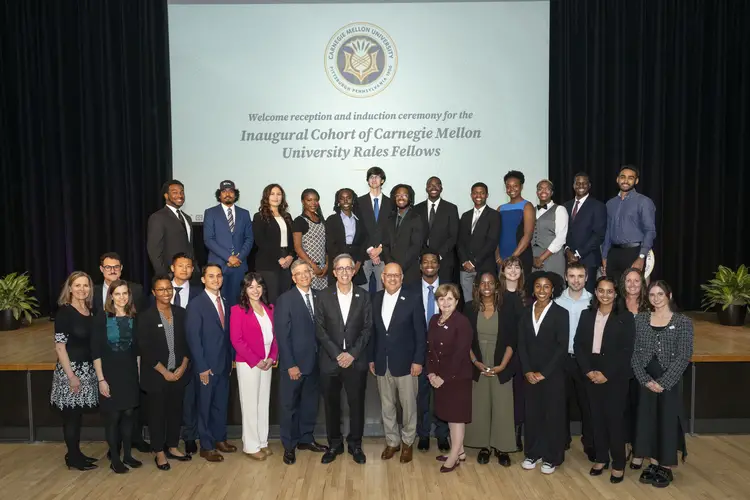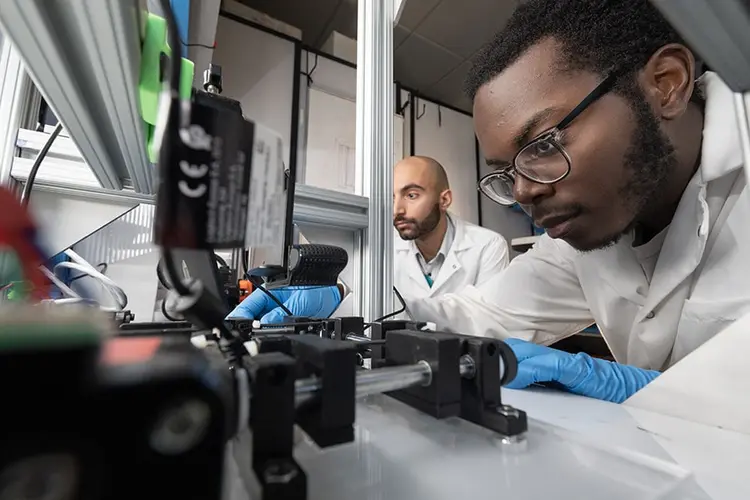CMU Rales Fellows Harness Unique Perspectives To Drive Innovation
Media Inquiries
Carnegie Mellon University is home to a diverse group of graduate students making significant strides in their respective fields, thanks to the support of the CMU Rales Fellows Program(opens in new window).
Dedicated to cultivating the next generation of STEM (science, technology, engineering and mathematics) leaders and driving innovation by increasing access to a life-changing graduate education, the CMU Rales Fellows Program removes financial barriers to obtaining advanced degrees and provides Fellows with holistic support, empowering and connecting scholars with others who share their passion for progress and innovation.
Among these talented and highly motivated students are Stacy Godfreey-Igwe(opens in new window), Ola Owodunni(opens in new window) and Abraham Polanco(opens in new window), who hope to harness their unique perspectives and lived experiences to make a meaningful impact in the world.
Advocating for energy equity and policy change
The Texas winter storm of 2021, also known as the Great Texas Freeze, had a profound impact on Stacy Godfreey-Igwe’s career aspirations. The storm led to widespread power outages, water shortages and significant property damage that affected millions of the state’s residents. It is estimated that a failure to winterize(opens in new window) power infrastructure resulted in at least 246 deaths(opens in new window) and damages over $195 billion(opens in new window). Godfreey-Igwe’s family lost power for a week.
“I was just an undergrad at the time, and I felt helpless and frustrated seeing people left to fend for themselves out in freezing temperatures, circumstances Texans are not used to. It opened my eyes to the vulnerabilities of low-income households in extreme weather events, and I wondered how certain policy considerations or interventions could have alleviated some of what people were going through,” she said.
Godfreey-Igwe graduated from the Massachusetts Institute of Technology with a bachelor’s degree in mechanical engineering and African/African Diaspora studies. Prior to becoming a CMU Rales Fellow, she worked in Washington, D.C., as a Science Policy Fellow for the Science Technology Policy Institute and an intern with the Department of Energy, where she witnessed firsthand how research could influence policy, especially in the energy space. Today, Godfreey-Igwe’s research focuses on the impact of extreme temperatures on energy consumption, particularly for low-income minority households.
She aims to use her Ph.D. in engineering and public policy(opens in new window) from CMU to develop sustainable technologies and policies that alleviate the energy burdens faced by marginalized communities. Her personal background growing up low-income and her educational journey as a Black woman in STEM, combined with her academic and professional experiences, drive her commitment to addressing energy inequities.
The Rales Fellowship has made Godfreey-Igwe’s transition to grad school smoother and more supportive than she anticipated. She values the mentorship and community provided by the CMU Rales Fellows program, which she said has been crucial to her academic and personal development.
“My adviser, Destenie Nock(opens in new window), whom I view as a leading figure in the field of energy inequity research, has had a profound impact on me,” she said. “Overall, the Engineering and Public Policy Department encourages interdisciplinary collaboration and focuses on providing engineers with skills to work on larger societal problems, and so all of that has been very appealing to me.”
Godfreey-Igwe envisions using her education to open doors for others, especially underrepresented groups in STEM, and is passionate about mentoring and providing positive support to future researchers. Long term, she is considering roles in academia or research organizations, focusing on a just energy transition and influencing policy decisions.
Journeying from biology to biomedical engineering
Ola Owodunni began her academic journey at CMU as a biology(opens in new window) and psychology(opens in new window) major, immersing herself in both the life sciences and social sciences. It wasn't until her junior year that she decided to pursue a minor in biomedical engineering(opens in new window), driven by her lifelong love for science and a particular fondness for math.
Initially, Owodunni hoped the minor would pave the way for a career developing medical devices; however, during her senior year she grappled with uncertainty about her career path. Despite not completing the minor, she applied for the master's program in biomedical engineering, drawn by her love for the classes and a need for more technical experience. She was accepted into the program, but she remained torn between pursuing the master's degree and attending physician assistant (PA) school, a long-held career aspiration.
“I didn’t know what side of health care I wanted to be on,” she said.
To gain clarity, she deferred her master's program for a year and worked as a medical assistant, a role that allowed her to float between various clinics at the University of Pittsburgh Medical Center, including surgery, chronic pain and internal medicine. The experience enabled her to connect with numerous health care providers and gain valuable clinical insights. She later moved into a research role focusing on LGBTQ mental health, a position she still holds.
Her research and clinical experiences reignited her excitement for biomedical engineering, leading her to resume pursuing the master's degree while also applying to PA school.
“My past experiences made me realize that I can be a well-rounded provider due to having knowledge on both the nonclinical and clinical side of medicine,” she said.
Through her BME studies, she has gained extensive knowledge about medical devices and human biomechanics and even created a device from scratch.
Looking ahead, Owodunni aims to merge her biomedical engineering expertise with clinical practice, hoping to conduct research and provide patient care. She emphasizes the importance of embracing diverse experiences and remaining open to new opportunities, as they can shape career paths in unexpected ways.
Reflecting on her journey, she shared, "I want others to know that it’s okay if you don’t know where you will be in five years, but it’s also important to experience whatever you can, since you never know what will drive you. I am grateful to CMU and the Rales Fellows Program for those opportunities."
Innovating chemical engineering solutions
Abraham Polanco grew up in Puerto Rico the youngest of five siblings, all of whom were homeschooled by their parents. On the beaches near where they live, a type of brown seaweed called sargassum has become a significant issue, and Polanco’s concerns about it sparked his interest in pursuing a career in chemical engineering(opens in new window).
“Sargassum can be dangerous when it accumulates in large quantities, reducing oxygen levels and light penetration in the water, which affects marine life and ecosystems,” he said. “It also produces harmful gases like methane and ammonia, posing health risks to humans and producing an unpleasant odor. Additionally, its impact on fisheries causes economic issues for islands that rely on fishing.”
While attending Polytechnic University of Puerto Rico as an undergrad, Polanco did a six-month co-op experience in the environmental health and safety department of a pharmaceutical company, where he managed projects in waste optimization and conducted root cause analyses. During this time, he participated in the Algae Prize Competition hosted by the U.S. Department of Energy. The research focused on combining sargassum with plastic to make filaments for 3D printing. The project showcased Polanco’s commitment to finding innovative solutions to real-world problems. The team made it to the top five out of 66 teams and received a prize of $10,000.
The professor who inspired Polanco to compete for the Algae Prize mentored him throughout his research, recommending him for the CMU Rales Fellows Program and inspiring him to pursue his Ph.D.
Once the competition ended, Polanco accepted a position at Boston Scientific, a medical device company that makes cardiac devices.
“Everyone in higher positions at any of the companies I’ve worked for had either master’s degrees or Ph.Ds.,” he said. “It occurred to me that if I really wanted to do impactful work, like research new ways to treat diseases, I needed to become an expert. That’s why I believe a Ph.D. is the right path for me.”
Polanco said the networking opportunities, support and mentorship that the Rales fellowship provides have been instrumental in his academic and professional growth.
“I’m excited about the potential impact of my research, particularly in the biotech and pharmaceutical fields, and I’m determined to use my education and experiences to drive positive change in the world,” he said.
